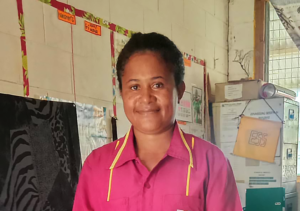In observance of the International Day of Women and Girls in Science, we celebrate the achievements of educators like Paula Niandros Polume, whose commitment to Science, Technology, Engineering and Maths (STEM) education is making a positive impact on student learning and environmental conservation.
As a teacher at Evangelical Church of Manus (ECOM) Secondary School, Paula is inspiring her students to address environmental challenges with innovative solutions.
 Confronted with the pressing issue of plastic waste in Lorengau, Paula leveraged her expertise to develop a project-based learning initiative empowering students to transform waste into practical items. Paula observed, “The disposal of these plastics into the sea is an ongoing problem, causing environmental damage.”
Confronted with the pressing issue of plastic waste in Lorengau, Paula leveraged her expertise to develop a project-based learning initiative empowering students to transform waste into practical items. Paula observed, “The disposal of these plastics into the sea is an ongoing problem, causing environmental damage.”
By integrating traditional weaving techniques with STEM principles, Paula’s approach to teaching has resonated with her students. She explained, “The students observed how they could create their own pencil case, purse or bag using plastic. I related this lesson back to geometry to explain how tessellation is part of weaving.”
This hands-on project not only enhances students’ understanding of geometry but also instills a sense of environmental responsibility.
Paula elaborated further that the STEM approach has helped the students to become creative, critical thinkers and authentic learners. “They collaborate and communicate to find solutions for problems. It allows students to become familiar with skills and processes which may help them to earn a living or supplement their income in the future by upcycling waste materials,” says Paula.
Paula is one of 39 Papua New Guinean women who obtained a Graduate Certificate in STEM Education through Australia Awards PNG.
